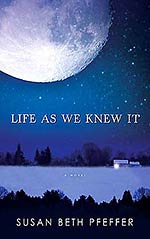
![]() rretzler
rretzler
3/18/2018
![]()
Miranda is an average 16-year-old girl, concerned with boys, friends, driving, and social activities. Her parents are divorced, and she lives with her mother, her younger brother, Jonny, and her older brother, Matt, who is away at college. They live in a small town in Pennsylvania. Her father has remarried, and he and his young wife have just announced that they are expecting their first child. One evening the world tunes in to watch a giant asteroid pass by the Moon; instead, it crashes into the Moon, knocking it out of orbit and much closer to the Earth. The Moon's new orbit causes tidal waves, volcanos and other natural disasters which cause temperatures to plummet and volcanic ash to block the sun. Those who survive must learn how to cope in the new world, and Miranda records her families struggles in her journal.
My younger son's teacher recommended this book to him, and we listened to the audio version, narrated by Emily Bauer. The premise of the book was intriguing - an apocalypse started by the Moon being knocked out of orbit, and at first, I thought the book was interesting. However, although the book does deal with some heavy issues regarding death, it mostly deals with the mundane part of surviving an apocalypse - finding food, water, warm shelter and keeping healthy. There is little action in the book. It is a very calm apocalypse; everyone seems well-behaved and non-violent, so I have to question whether the book is actually realistic. At one point in the book, as gas was is rationed and food hard to find, Miranda's mother drives Jonny to an out-of-town baseball camp for several weeks. Now, I don't know about anyone else, but in that situation, I would do everything I could to keep my family together, not leave one of my children at a baseball camp. From the standpoint of watching Miranda grown from a typical teenage girl to a young woman who took care of her flu-ridden family, saving them from a carbon monoxide poisoning due to a faulty wood-burning stove, the book is a success. However, one can only listen to so much talk about skipping meals and sharing cans of mixed vegetables before it starts to become tedious.
I thought Emily Bauer's voice was a little too optimistic about everything. It seems like her voice rose happily at the end of every sentence, and how happy and optimistic can one actually be when facing their own death and that of their family.
I feel as though I should have liked this book. I didn't dislike it enough to stop listening, but I wasn't crazy about it either. Meh!